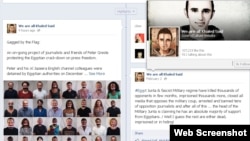CAIRO —
In the 10 years since the launch of Facebook, few countries' political life has been as affected by the social network as Egypt.
In June, 2010, a young Egyptian was beaten to death by police in Alexandria. Even though there were numerous witnesses, police claimed the victim choked to death while trying to hide drugs.
Despite efforts by friends and family to unearth the truth, 28-year-old Khaled Said appeared destined to become yet another obscure statistic in a long history of Egyptian police brutality.
Enter Facebook. Supporters of the young man created a page on the popular social network called “We are all Khaled Said.” With hundreds of thousands of likes, it was the center piece of an emerging wave of resistance to the repressive rule of President Hosni Mubarak.
Khaled Said's killers went on trial. And a new generation of opposition forces found a way to unite.
The activists behind the January 2011 uprising against the Mubarak government have credited Facebook for helping them organize and mobilize their revolt.
Cairo-based journalist Bel Trew, speaking to Reuters, explained that during that time, it also acted as an alternative to traditional Egyptian media.
"Citizen journalism really exploded in 2011 and Facebook and Twitter were one of those ways, well two of those ways, that people were able to get information out there to the rest of the world because their own media wasn't helping," she said.
With an estimated 16 million members, Egypt is the biggest Facebook user in the Arab world, a fact not lost on subsequent leaders. The military used it to communicate during their rule after the revolution, as did the Muslim Brotherhood supporters of President Mohamed Morsi.
In the crackdown on dissent and street protests since the Morsi ouster last year, his supporters have increasingly turned to Facebook.
Such online activism can come at a price. Authorities last week arrested 11 Muslim Brotherhood members on charges of using their accounts for “inciting violence.”
But even as Egyptian jails fill with people deemed anti-government forces, including journalists from Al Jazeera, critics of the crackdown keep turning to the social network to get their point across. On Tuesday, Facebook's 10th anniversary, journalists from around the world posted their support for their imprisoned colleagues.
In June, 2010, a young Egyptian was beaten to death by police in Alexandria. Even though there were numerous witnesses, police claimed the victim choked to death while trying to hide drugs.
Despite efforts by friends and family to unearth the truth, 28-year-old Khaled Said appeared destined to become yet another obscure statistic in a long history of Egyptian police brutality.
Enter Facebook. Supporters of the young man created a page on the popular social network called “We are all Khaled Said.” With hundreds of thousands of likes, it was the center piece of an emerging wave of resistance to the repressive rule of President Hosni Mubarak.
Khaled Said's killers went on trial. And a new generation of opposition forces found a way to unite.
The activists behind the January 2011 uprising against the Mubarak government have credited Facebook for helping them organize and mobilize their revolt.
Cairo-based journalist Bel Trew, speaking to Reuters, explained that during that time, it also acted as an alternative to traditional Egyptian media.
"Citizen journalism really exploded in 2011 and Facebook and Twitter were one of those ways, well two of those ways, that people were able to get information out there to the rest of the world because their own media wasn't helping," she said.
With an estimated 16 million members, Egypt is the biggest Facebook user in the Arab world, a fact not lost on subsequent leaders. The military used it to communicate during their rule after the revolution, as did the Muslim Brotherhood supporters of President Mohamed Morsi.
In the crackdown on dissent and street protests since the Morsi ouster last year, his supporters have increasingly turned to Facebook.
Such online activism can come at a price. Authorities last week arrested 11 Muslim Brotherhood members on charges of using their accounts for “inciting violence.”
But even as Egyptian jails fill with people deemed anti-government forces, including journalists from Al Jazeera, critics of the crackdown keep turning to the social network to get their point across. On Tuesday, Facebook's 10th anniversary, journalists from around the world posted their support for their imprisoned colleagues.




